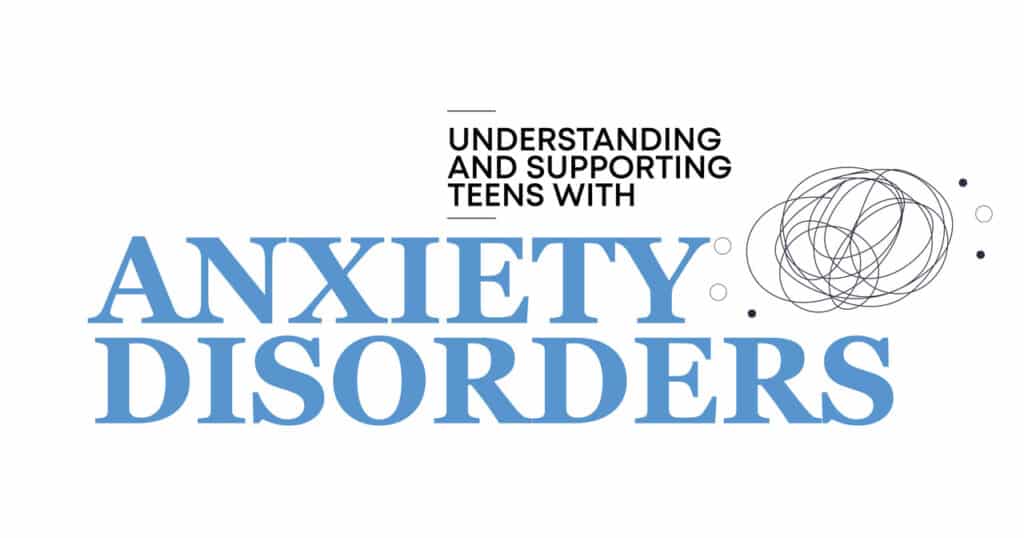Navigating the complexities of teen anxiety can be challenging for parents, educators, and mental health professionals. Anxiety disorders are increasingly common among teenagers and can significantly impact their daily lives, academic performance, and relationships.
Essential Takeaways
- Understanding teen anxiety involves recognizing the signs of anxiety and providing emotional support.
- Effective strategies include open communication, coping skills, and a healthy lifestyle.
- Seeking professional help and utilizing available resources can make a significant difference in managing anxiety in adolescents.
Understanding these disorders in children and knowing how to support affected teens is crucial. In this guide, we’ll explore what anxiety disorders are, how they manifest in teens, and provide actionable strategies for support.
Introduction: Navigating Teen Anxiety
Teen anxiety can feel like a maze of emotions and behaviors, often leaving parents and caregivers wondering how best to provide support. With the pressures of academic expectations, social dynamics, and personal development, it’s no surprise that many teens experience excessive anxiety. Understanding what anxiety disorders entail and recognizing the signs of anxiety in teens is the first step toward providing adequate support and creating a positive environment for their well-being.
Hillside Horizon
What Are Anxiety Disorders?
Anxiety disorders are mental health conditions characterized by excessive worry, fear, or panic that interfere with a person’s daily life. These disorders in childhood are more than just occasional stress or nerves; they are persistent and often overwhelming. For teens, anxiety can manifest in various forms, each affecting their ability to function normally.
Generalized Anxiety Disorder (GAD)
Generalized anxiety disorder is marked by chronic and excessive worry about various aspects of life, such as academics, social interactions, or future events. Teens with GAD often find it difficult to control their worry and may experience physical symptoms like muscle tension, fatigue, and shortness of breath.
Social Anxiety Disorder
Social anxiety disorder involves an intense fear of social situations where one might be scrutinized or judged by others. For teens, this could mean avoiding school events, social gatherings, or even speaking in class due to fear of embarrassment or rejection. This intense fear can lead to avoidance behaviors, making it crucial for parents to recognize and address these patterns early on.
Panic Disorder
Panic disorder is characterized by recurrent and unexpected panic attacks—sudden periods of intense fear or discomfort that peak within minutes. Symptoms include a rapid heartbeat, chest pain, dizziness, and feelings of impending doom. These attacks can be distressing and lead to avoidance behaviors as teens try to prevent the anxiety-provoking situations that trigger these episodes.
Specific Phobias
Specific phobias involve irrational fears of particular objects or situations, such as heights, spiders, or flying. These fears can be debilitating and lead to avoidance of the feared object or situation, impacting daily functioning.
Why Teens Are at Risk
Teenagers are in a unique developmental stage characterized by significant changes and stressors. Hormonal fluctuations, social pressures, and academic demands can contribute to the development of anxiety disorders. Understanding why teens are particularly vulnerable can help in tailoring support strategies effectively.
Developmental Changes
Adolescence is a time of rapid physical, emotional, and cognitive development. These changes can lead to increased sensitivity and heightened stress, which may trigger or exacerbate anxiety in children.
Academic Pressures
The pressure to excel academically can be overwhelming for teens. High expectations from parents, teachers, and themselves can lead to performance anxiety and fear of failure.
Social Dynamics
Teens navigate complex social landscapes, including peer relationships, social media, and identity formation. The desire for social acceptance and the fear of rejection can contribute to anxiety in adolescents.
Family and Environmental Factors
Family dynamics, such as parental expectations or family conflicts, can also play a role in the development of anxiety. A supportive family environment is crucial for mitigating these risks. For instance, family therapy can be effective in addressing underlying issues that contribute to a teen’s anxiety.
Recognizing the Signs of Anxiety in Teens
Identifying anxiety in teens can be challenging, as symptoms may be subtle or masked by typical teenage behaviors. However, awareness of the common symptoms of anxiety disorders can help in early detection and intervention.
Common Symptoms of Anxiety Disorders
Teens with anxiety disorders may exhibit a range of symptoms, including:
- Excessive Worry: Persistent and excessive anxiety about various aspects of life, such as school performance or social interactions, can be a sign of anxiety. This worry is often disproportionate to the actual situation and can be difficult for the teen to control.
- Physical Symptoms: Anxiety in teens can manifest physically, leading to complaints of headaches, stomachaches, or general fatigue. These physical complaints often have no clear medical cause and may improve with anxiety management.
- Behavioral Changes: Teens with anxiety may withdraw from social activities, avoid certain situations, or display increased irritability. Changes in behavior, such as reluctance to attend school or participate in previously enjoyed activities, can indicate underlying anxiety.
- Difficulty Concentrating: Anxiety can affect cognitive functioning, making it challenging for teens to concentrate on schoolwork or daily tasks. Preoccupation with anxious thoughts can interfere with their ability to focus and perform effectively.
How to Differentiate Anxiety from Typical Teen Stress
While stress is a normal part of adolescence, anxiety disorders involve more intense and persistent symptoms. Differentiating between typical stress and anxiety is crucial for determining the appropriate level of intervention.
- Typical Stress: Everyday teenage stress is usually tied to specific events or situations, such as exams or social gatherings. It tends to be temporary and resolves once the stressor is removed or managed.
- Anxiety Disorders: Anxiety disorders involve persistent and excessive worry or fear that interferes with daily life. Symptoms are often out of proportion to the actual stressor and can lead to significant functional impairments.
Hillside Horizon
Supporting Teens with Anxiety Disorders
Supporting teens with anxiety disorders requires a multifaceted approach that includes emotional support, practical strategies, and collaboration with professionals. Here’s how you can make a difference:
Effective Strategies for Parents and Caregivers
- Open Communication and Validation: Creating an open and supportive environment is key to helping teens manage their anxiety. Encourage them to express their feelings and validate their experiences without judgment.
- Active Listening: Practice active listening by giving your full attention and empathy when your teen shares their concerns. Avoid interrupting or offering immediate solutions; instead, focus on understanding their perspective.
- Avoid Minimizing Their Concerns: Ensure your teen’s feelings of anxiety are valid, even if their worries seem irrational. Minimizing their concerns can discourage them from opening up and seeking help.
Building Coping Skills
Helping teens develop practical coping skills can empower them to manage their anxiety more effectively.
- Relaxation Techniques: Introduce relaxation strategies that can help reduce anxiety symptoms. Techniques such as deep breathing exercises, progressive muscle relaxation, and mindfulness can effectively manage stress.
- Deep Breathing: Teach your teen to take slow, deep breaths to calm their nervous system and reduce anxiety. This breathing exercise can be particularly effective in moments of acute stress or panic.
- Progressive Muscle Relaxation: Guide them through tensing and relaxing different muscle groups to release physical tension.
- Mindfulness: Encourage mindfulness practices focusing on staying present and observing thoughts and feelings without judgment.
Problem-Solving Skills
Teach your teen problem-solving skills to help them approach challenges with a proactive mindset. Encourage them to identify problems, brainstorm solutions, and evaluate the effectiveness of their strategies.
Encouraging Healthy Lifestyle Choices
A healthy lifestyle can significantly help manage anxiety. Encourage your teen to adopt habits that promote overall well-being.
- Regular Exercise: Physical activity is known to reduce anxiety and improve mood. Encourage your teen to exercise regularly, such as walking, jogging, or playing a sport they enjoy.
- Balanced Diet: A nutritious diet supports both physical and mental health. Ensure your teen consumes a balanced diet with adequate vitamins, minerals, and proteins to support their well-being.
- Adequate Sleep: Good sleep hygiene is essential for managing anxiety. Help your teen establish a consistent sleep routine and create a relaxing bedtime environment.
Supporting Teens in the School Environment
The school environment can be both a source of stress and a potential support system for teens with anxiety. Here’s how to foster a supportive school experience:
Collaborating with Educators
Work closely with teachers and school counselors to ensure your teen receives the support they need.
- Informing School Staff: Share relevant information about your teen’s anxiety with their teachers and counselors to foster understanding and cooperation.
- Accommodations: Discuss potential accommodations, such as extended test times or a quiet space for exams, to help manage anxiety in academic settings.
Promoting a Positive School Experience
Encourage your teen to build positive relationships and participate in extracurricular activities.
- Supportive Friendships: Help your teen develop strong, supportive friendships that provide a sense of belonging and reduce anxiety.
- Extracurricular Activities: Encourage involvement in activities like clubs or sports that can boost self-esteem and provide a constructive outlet for stress.
Seeking Professional Help
When anxiety becomes severe or persistent, seeking professional help is crucial. A mental health professional can provide a comprehensive evaluation and tailored treatment plan.
When to Consult a Mental Health Professional
If anxiety symptoms are significantly impacting your teen’s daily life, academic performance, or social interactions, it’s essential to seek professional help. Warning signs may include:
- Persistent and Severe Symptoms: If your teen’s anxiety lasts for several weeks or interferes with their daily functioning.
- Avoidance Behaviors: If your teen avoids school, social events, or other activities they previously enjoyed due to anxiety.
- Physical Symptoms: If your teen experiences physical symptoms like headaches or stomachaches without a clear medical cause.
Hillside Horizon
Conclusion: Supporting Teens on Their Journey
Supporting a teen struggling with anxiety can feel overwhelming, but with the right tools and strategies, you can make a significant difference in their journey toward mental wellness. By fostering open communication, teaching coping skills, and seeking professional help when needed, you can empower your teen to manage their anxiety effectively and lead a fulfilling life. Remember, every step you take in supporting your teen is a step toward resilience and recovery.





